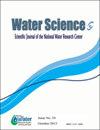Assessment of agricultural drainage water reuse for irrigation in El-Behira Governorate, Egypt
Q2 Environmental Science
引用次数: 7
Abstract
ABSTRACT Agriculture sector and food security of Egypt are under stresses due to the shortage of freshwater budget. Agricultural drainage water reuse can be considered as the most appropriate solution to overcome the irrigation water shortage. Quality of the reused drainage water is of concern, particularly in arid regions, such as Egypt, due to salinity problems. Therefore, water quality assessment for reuse projects is essential. The objective of this work is to assess three different drainage water reuse projects in El-Behira Governorate, Egypt, based on experimental records and water quality index approach. Thirty-six water samples were seasonally collected from three different projects during 2017. Drainage water, freshwater and blended water were evaluated according to the Egyptian and international (FAO) guidelines for drainage and irrigation water. Moreover, CCME-WQI and NSF-WQI were applied to assess the drainage and irrigation water according to the Egyptian standards. Most the recorded parameters for drainage and irrigation water exceeded the permissible limits. The results confirmed the “Poor” and “Marginal” water quality status of all studied drains (drainage water) according to the Egyptian standards. The water quality status of all studied canals (blended water) was classified as “Bad” according to NSF-WQI. These results confirm that current drainage and blended water in the study are shouldn’t be used. To avoid deterioration of the soil, crops, food security elements and health protection, treatment systems for drainage water are urgently recommended. Drainage water reuse projects should be carefully installed, and water quality assessment should be accompanied with these projects. This study is the base for an ongoing pilot project of using a low-cost drainage water improvement technology which can be considered as a supplemented tool to drainage water reuse.埃及El-Behira省农业排水回用灌溉评价
摘要:由于淡水预算短缺,埃及农业部门和粮食安全面临压力。农业排水回用可以被认为是克服灌溉缺水的最合适的解决方案。由于盐度问题,再利用排水的质量令人担忧,尤其是在埃及等干旱地区。因此,对回用项目进行水质评估至关重要。这项工作的目的是根据实验记录和水质指数方法,评估埃及El Behira省的三个不同的排水回用项目。2017年,从三个不同的项目中季节性采集了36个水样。排水、淡水和混合水根据埃及和国际(粮农组织)排水和灌溉用水指南进行了评估。此外,根据埃及标准,应用CCME-WQI和NSF-WQI对排水和灌溉水进行评估。大多数记录的排水和灌溉用水参数都超过了允许的限度。结果证实,根据埃及标准,所有研究排水沟(排水)的水质状况均为“差”和“边际”。根据NSF-WQI,所有研究运河(混合水)的水质状况均被归类为“不良”。这些结果证实了研究中不应使用现有的排水和混合水。为了避免土壤、作物、粮食安全要素和健康保护的恶化,迫切建议采用排水处理系统。排水回用项目应仔细安装,水质评估应与这些项目同时进行。这项研究是正在进行的使用低成本排水改善技术的试点项目的基础,该技术可以被视为排水再利用的补充工具。
本文章由计算机程序翻译,如有差异,请以英文原文为准。
求助全文
约1分钟内获得全文
求助全文

 求助内容:
求助内容: 应助结果提醒方式:
应助结果提醒方式:


